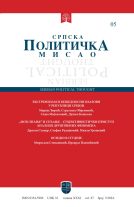- Home page
- Researchers
- МА Miloš Vulić
МА Miloš Vulić

- Address: /
- Email: milos.vulic@lux-dog.com
- Telephone: /
- LinkedIn: /
Miloš Vulić, Research Assistant at the Institute for political studies, Belgrade, was born in Kragujevac, where he completed his high school education. He completed his basic interdisciplinary academic studies at the Pontifical Gregorian University (Pontificia Università Gregoriana) in Rome at the Faculty of Philosophy (Facoltà di Filosofia) and the Faculty of Theology (Facoltà di Teologia) with a thesis on personalistic philosophy. He completed his specialist studies at the same university at the Faculty of Social Sciences (Facoltà di Scienze Sociali) with a thesis on political leadership. At the University of Belgrade, he completed interdisciplinary master's academic studies on the Religion in Society, Culture and European Integrations program with a thesis on the relationship of pontifical diplomacy to European integrations. He enrolled in doctoral academic studies (international and European studies) at the Faculty of Political Sciences of the University of Belgrade in 2021.
In addition to his academic education, he completed prominent political education programs. At the Konrad Adenauer Foundation (Konrad-Adenauer-Stiftung) in Belgrade, he completed the "Summer School of Social Market Economy" as well as the educational program for young leaders "Politikas". At the De Gasperi Foundation (Fondazione De Gasperi), he completed the "School of Political Education" (Scuola di Formazione Politica) as well as the "Foreign, Security and Defense Policy: Present and Future of the European Union" program (Politica estera, di sicurezza e difesa: il presente e il futuro dell'Unione Europea). He also completed a professional internship at the Embassy of the Republic of Serbia (RS) at the Holy See (Vatican) and the Diplomatic Academy of the Ministry of Foreign Affairs of the RS.
He won the first prize in the competition for the best student work on the European Union (in 2020), which is announced by the Ministry of European Integration of the RS. The topic of the awarded paper was: The meaning of solidarity in European integration: Schuman's vision and the challenges of the crisis. He was a scholarship holder of the German Renovabis and Konrad Adenauer foundations, as well as of the Embassy of the Republic of France to the Holy See (Vatican) for learning the French language at the French Institute (Institut français: Center Saint-Louis) in Rome. He speaks English, Italian and French.
Before working at the Institute for Political Studies, he worked at the Ministry of European Integration of the RS.

ORDOLIBERAL POLITICAL PHILOSOPHY: THE PHENOMENON OF THE SOCIAL-MARKET ECONOMY
In this paper, we will deal with ordoliberal political philosophy and the social-market economy as its key phenomena. Our goal is to try to show the development path of the term, its initial perception, but also its later reception. In the first part of the work, the sources of the social-market economy are analyzed, of which the Christian social doctrine, which was born as a reaction to economic-political problems, stands out as the main source. Special attention is paid to papal encyclicals, which form the basis of the Christian-democratic ideology. The second part is devoted to the development of the social market economy. In it, we deal with the emergence of the Freiburg School and the thought of its main representatives, who will introduce the concept of order into the liberal tradition, which is why they will remain known as members of ordoliberalism. The third part analyzes the systematization of the social-market economy, with special reference to the relationship between the philosophies of ordoliberalism and neoliberalism, in terms of their similarities and differences. In that part, we deal with the international context of this political philosophy through the formation of the Mont Pelerin Society. The last part of the paper discusses the reception of the social market economy, in the German and European context, with the conclusion that in times of repeated global crises, the values that the ordoliberal political philosophy and the phenomenon of the social market economy carry with them can once again contribute to the responsibility of economic and political actors.
